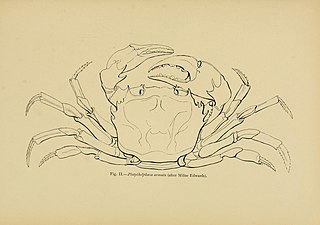
Lake Victoria is one of the African Great Lakes. With a surface area of approximately 59,947 km2 (23,146 sq mi), Lake Victoria is Africa's largest lake by area, the world's largest tropical lake, and the world's second-largest fresh water lake by surface area after Lake Superior in North America. In terms of volume, Lake Victoria is the world's ninth-largest continental lake, containing about 2,424 km3 (1.965×109 acre⋅ft) of water. Lake Victoria occupies a shallow depression in Africa. The lake has an average depth of 40 m (130 ft) and a maximum depth of 80–81 m (262–266 ft). Its catchment area covers 169,858 km2 (65,583 sq mi). The lake has a shoreline of 7,142 km (4,438 mi) when digitized at the 1:25,000 level, with islands constituting 3.7% of this length.

Emin's pouched rat, also known as the African pouched rat, is a large rat of the muroid superfamily. It is related to Cricetomys gambianus, the Gambian pouched rat. Both species belong to Cricetomys, the genus of the giant pouched rats.

Emin's gerbil or Emin's tateril is a species of rodent found in the Democratic Republic of the Congo, Ethiopia, Kenya, Sudan, and Uganda. Its natural habitats are dry savanna, subtropical or tropical dry lowland grassland, and arable land.

The lazy cisticola is a species of bird in the family Cisticolidae. It is widespread throughout sub-Saharan Africa.

The three-banded courser is a species of bird in the family Glareolidae. It is found in Angola, Botswana, Ethiopia, Kenya, Namibia, Rwanda, Somalia, Somaliland, South Africa, South Sudan, Tanzania, Uganda, Zambia, and Zimbabwe.

Platythelphusa is a genus of freshwater crabs endemic to Lake Tanganyika. It has been placed in a number of families, including a monotypic family, Platythelphusidae, as well as Potamidae and its current position in the Potamonautidae, and has also been treated as a subgenus of Potamonautes. It forms a monophyletic group, possibly nested within the genus Potamonautes, which would therefore be paraphyletic. The genus is the only evolutionary radiation of crabs to have occurred in a freshwater lake, and it occurred recently, probably since the Pliocene. This parallels the better known radiation of cichlid fishes in Lake Tanganyika. Only one other species of freshwater crab is found in Lake Tanganyika, Potamonautes platynotus.

Potamonautes is a genus of African freshwater crabs in the family Potamonautidae. It is both the most widespread and most diverse genus of African freshwater crabs, including more than half the species of this continent. They are found in most freshwater habitats of the African mainland and some species are semi-terrestrial.
Potamonautes choloensis is a species of freshwater crustacean in the family Potamonautidae.
Potamonautes gerdalensis is a species of crab in the family Potamonautidae. It is found in the Democratic Republic of the Congo, Kenya, Tanzania, and Uganda. Its natural habitats are rivers and freshwater lakes. It is threatened by habitat loss.
Potamonautes gonocristatus is a species of crustacean in the family Potamonautidae. It is endemic to Lake Kivu, on the border between the Democratic Republic of the Congo and Rwanda.
Potamonautes idjiwiensis is a species of crustacean in the family Potamonautidae. It is endemic to the island of Idjwi in Lake Kivu, the Democratic Republic of the Congo. Its natural habitats are streams and other freshwater habitats.

Potamonautes lirrangensis, the Malawi blue crab, is a species of freshwater crab in the family Potamonautidae. This common and widespread species is found in Lake Malawi, Lake Kivu, the upper Congo River Basin and Malagarasi River in the Democratic Republic of the Congo, Malawi, Rwanda, and Tanzania. In the freshwater aquarium trade it is sometimes sold under the synonym Potamonautes orbitospinus.
Potamonautes loveridgei is a species of crustacean in the family Potamonautidae. It is found in the rivers that flow into Lake Tanganyika.
Potamonautes montivagus is a species of freshwater crustacean in the family Potamonautidae. It is native to southeastern Africa. Its natural habitat is rivers.
Potamonautes mutandensis is an endangered species of freshwater crab in the family Potamonautidae. It is found in Lake Mutanda and Lake Kivu in Uganda, Rwanda and DR Congo.
Potamonautes niloticus is a species of freshwater crab in the family Potamonautidae. It is found in the Nile Basin in Egypt, Ethiopia, Rwanda, Sudan, and Uganda. Numerous specimens of P. niloticus are known from Miocene deposits around Lake Albert.
Potamonautes platycentron is a species of freshwater crab in the family Potamonautidae, which is endemic to Lake Chala in Kenya and Tanzania. It was originally described by Franz Martin Hilgendorf in 1897, as Telphusa platycentron.

Potamonautes platynotus is a species of freshwater crab which is endemic to Lake Tanganyika, where it is the only freshwater crab outside the genus Platythelphusa. Although primarily aquatic, P. platynotus is sometimes seen out of water, and can survive for many hours without water.
Potamonautes rukwanzi is a species of crustacean in the family Potamonautidae. It is endemic to Uganda. Its natural habitat is freshwater lakes.
Potamonautes lividus, also known as the blue river crab, is a species of decapod in the family Potamonautidae. P. lividus is endemic to the country of South Africa in a area of 200 kilometers squared. The species prefers inland freshwater bodies in wetlands, bogs, marshes, freshwater swamp forests and peatlands (mire). P. livisus is found most often in the province Kwa-Zulu Natal in South Africa with the species also living in Richards bay, Ntambanana, Mtubatuba and uncoifirmed sighting in the Amatikulu river which if confirmed, represents the southern most members of the Potamonautes lividus species.









